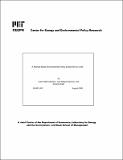| dc.contributor.author | Montero, Juan-Pablo | en_US |
| dc.contributor.author | Katz, Ricardo Santiago | en_US |
| dc.contributor.author | Sánchez, José Miguel | en_US |
| dc.contributor.other | Massachusetts Institute of Technology. Center for Energy and Environmental Policy Research. | en_US |
| dc.date.accessioned | 2009-04-03T17:04:30Z | |
| dc.date.available | 2009-04-03T17:04:30Z | |
| dc.date.issued | 2000 | en_US |
| dc.identifier | 2000-005 | en_US |
| dc.identifier.uri | http://hdl.handle.net/1721.1/44969 | |
| dc.description.abstract | Despite growing interest in the use of emissions trading for pollution control, empirical evidence for this regulatory instrument has been confined to a few experiences in the United States. This paper broadens the empirical base by examining the "Emission-Offsets Trading Program" that has been in place since 1992 to control airborne particulate emissions in Santiago, Chile. While the program is doing well from an environmental perspective, due in part to the price-based introduction of natural gas, the market is performing poorly because of high transaction costs, uncertainty, and poor enforcement. However, the scarcity rents created by allocating grandfathered emission rights to incumbents have proved to be a very effective tool for completing the emissions inventory. | en_US |
| dc.description.sponsorship | Supported by the MIT Center for Energy and Environmental Policy Research. | en_US |
| dc.format.extent | 28 p | en_US |
| dc.publisher | MIT Center for Energy and Environmental Policy Research | en_US |
| dc.relation.ispartofseries | MIT-CEEPR (Series) ; 00-005WP. | en_US |
| dc.title | A market-based environmental policy experiment in Chile | en_US |
| dc.type | Working Paper | en_US |
| dc.identifier.oclc | 52316162 | en_US |
